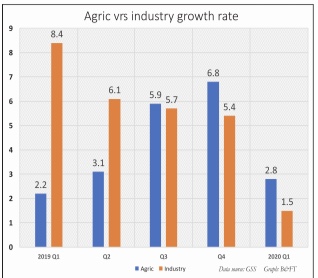For the third consecutive time, quarterly GDP figures from the Ghana Statistical Service (GSS) indicate that the agriculture sector has outpaced the industrial sector in growth, making it the first time in recent history, at least since rebasing of the economy in 2013, even though the sector is one of the least attractive to investors and banks’ credit.
The figures show that the agriculture sector grew at 5.9 percent in the third quarter of 2019; 6.8 percent in the fourth quarter; and a slower rate of 2.8 percent in the first quarter of 2020. However, industry, which has always been ahead of agriculture for some years now, grew by 5.7 percent, 5.4 percent, and 1.5 percent respectively in the periods stated.
Agriculture’s seeming revival, especially in the first quarter of this year, can be attributed to the fishing sector – a sector which has been performing abysmally over the years but have recently shown signs of recovery. The sector, which was formerly trailing all sub-sectors in the agriculture sector, is now the best performing, growing at a significant 14.1 percent in Q1 of 2020 compared to -1.5 percent contraction a year ago.
These indicate that, if more investment, particularly financial support is given to the agriculture, which has long been touted as the backbone of the economy – considering it employs the largest number of people, especially women – the sector can regain its lost glory it. And again, if the fishing sector, especially marine, is rid of all illegal, unreported and unregulated fishing, popularly known as ‘saiko’, agriculture can become one of the biggest contributors to GDP. Its contribution to GDP in 2019 stood at 18.5 percent compared to industry’s 34.2 and services’ 47.2 percent.
But sadly, finance to agriculture has been disappointing over the years, as the sector is still considered risky to lenders. The banking sector report published by the Bank of Ghana shows that, the agriculture sector’s share of credit distribution from banks was among the lowest in the first quarter of this year. Its share was a measly 4.6 percent compared to the services sector which received 28.8 percent share; commerce and finance sector with a share of 19.9 percent and manufacturing sector with 10.1 percent share.
What experts say
Several experts have called for massive investments into agriculture to attract big investors and also encourage the youth to inject some energy to the sector that has the most ageing workforce in the country.
For the Director of the Institute of Social, Statistical and Economic Research of the University of Ghana, Professor Peter Quartey, to make agriculture attractive to big investors, government must invest heavily in infrastructure that will facilitate farming activities and secure their investments.
He says one of the major challenges in the sector is the rampant land litigation issues which has been a threat to investors and, eventually, led some to abandon their investments.
Prof. Quartey says until this serious issue is resolved, the agriculture sector will still be unable to attract big investors.
“In any serious country that wants private investment in agriculture, you find governments take the initiative to create the enabling environment, then the private sector moves in. so if you want that large scale production, it is not only about subsidising fertilisers, but to help investors secure land.
Land is a big issue in large scale agriculture, and many investors have lost their money due to land litigation. So the first step is for government to acquire land or help the private investor acquire agriculture land. That for me, is the first major step, he said in an earlier interview with the B&FT.
And to Professor Emeritus Kobina Yankson of Department of Fisheries and Aquatic Sciences at the University of Cape Coast, who also spoke to the B&FT earlier, if government puts appropriate measures in place to successfully stump out illegal, unreported and unregulated fishing, the fishing sector can contribute more than is doing now, thereby, pushing growth and contribution of the agriculture sector in national development.
“Our fisheries sector especially the marine section, is facing challenges and those challenges have to be removed if the gains in contribution to GDP can be made. The Illegal Unreported and Unregulated fishing must be stopped, especially, saiko fishing. So, for us to improve the growth in the sector, appropriate fishing management must be in place to address the challenges.”










